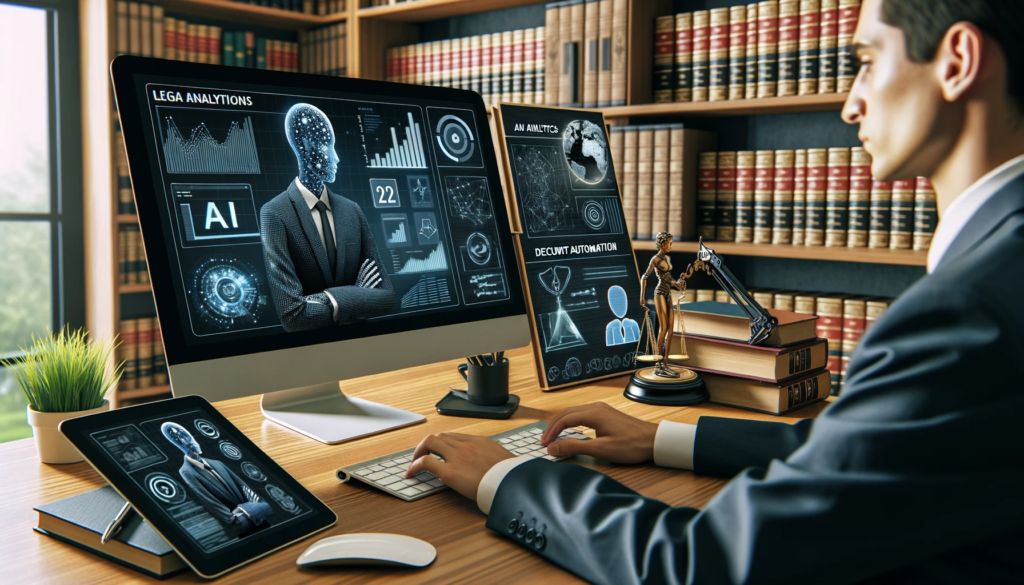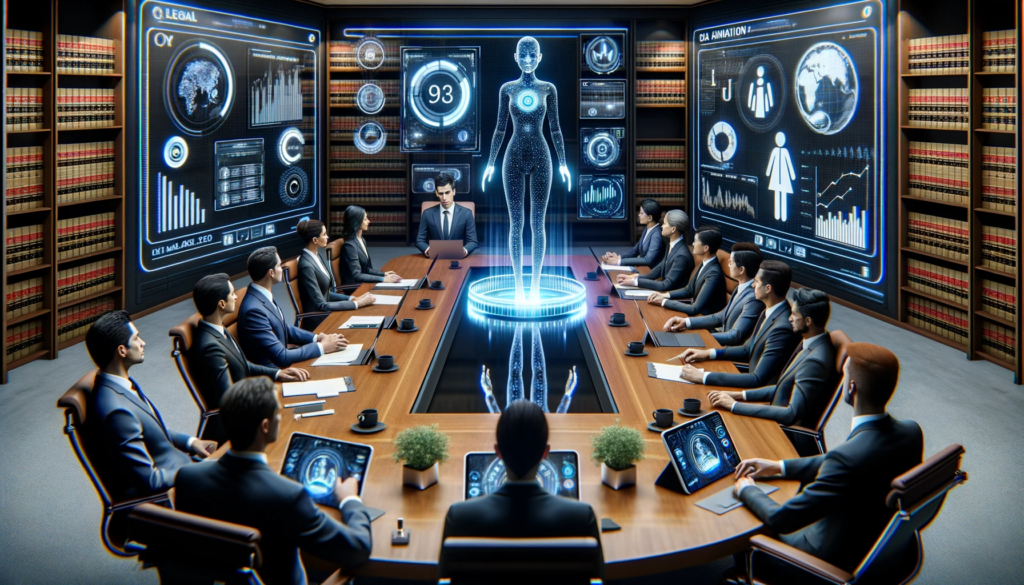The Future of AI in Legal Services: Revolutionizing the Industry

In “The Future of Legal Services: AI Revolutionizing the Industry,” discover the incredible potential of artificial intelligence (AI) in the field of law. With the ability to automate repetitive tasks, analyze vast amounts of data, and provide valuable insights, AI is transforming the way legal services are delivered.
This article explores how individuals can leverage AI technology to establish a profitable online business focused on providing AI-powered legal services. Embark on a fascinating journey into the future of the legal industry, where innovation and efficiency are redefining the way legal professionals work.
The Future of Legal Services: AI Revolutionizing the Industry

Overview of AI in Legal Services
Artificial Intelligence (AI) has emerged as a game-changer in various industries, and the legal field is no exception. AI technology has the potential to revolutionize the way legal services are delivered, making them more efficient, accurate, and accessible. This article explores the current and future applications of AI in the legal industry, the benefits it brings, the challenges it faces, and the impact it has on the legal profession.
Benefits of AI in the Legal Industry
Increased Efficiency and Productivity
One of the significant advantages of AI in the legal industry is its ability to improve efficiency and productivity. AI-powered systems can automate mundane and time-consuming tasks, such as document review and contract analysis, allowing legal professionals to focus on more complex and strategic work. By relieving lawyers of tedious tasks, AI technology enables them to save valuable time and complete their work more efficiently.
Improved Accuracy and Reduction of Errors
AI algorithms are designed to process large amounts of data and identify patterns that might be missed by humans alone. This capability enhances the accuracy of legal research and analysis, reducing the risk of errors. With AI-powered systems, legal professionals can rely on more comprehensive and precise information, leading to better-informed decision-making and higher-quality work.
Cost-Savings and Enhanced Cost Predictability
Implementing AI in legal services can bring significant cost savings for both law firms and their clients. AI-powered systems can streamline repetitive processes, eliminating the need for manual labor and reducing human error. As a result, law firms can optimize their resources, increase their productivity, and provide services at a lower cost. Furthermore, AI technology enables enhanced cost predictability, as it can accurately estimate the time and effort required for various legal tasks.
Faster Legal Research and Due Diligence
Legal research and due diligence are crucial aspects of the legal profession, but they often consume a significant amount of time. AI-powered tools can accelerate these processes by swiftly analyzing vast amounts of legal data, including case law, statutes, and regulations. By automating the research and due diligence tasks, AI technology enables lawyers to quickly access relevant information, saving time and increasing overall efficiency.
Enhanced Contract Analysis and Generation
AI technology can revolutionize contract analysis and generation, making the process faster and more accurate. AI-powered systems can automatically review contracts, identify key clauses, and flag potential risks. Additionally, AI can assist in contract generation by providing standardized templates and clauses, ensuring consistency and reducing the chances of errors. By leveraging AI in this area, legal professionals can deliver more efficient contract management services to their clients.
Access to Legal Services for Underrepresented Individuals
AI has the potential to bridge the access-to-justice gap by making legal services more accessible to underrepresented individuals and communities. With AI-powered virtual assistants and chatbots, individuals can obtain basic legal advice and information outside of traditional office hours. These AI-enabled tools can provide 24/7 support, answer frequently asked questions, and guide individuals through various legal processes. By leveraging AI technology, legal professionals can expand their reach and provide legal assistance to a broader audience.
Challenges Faced by AI in Legal Services
While AI has enormous potential in the legal field, it also faces several challenges that need to be addressed. These challenges include:
Data Privacy and Security Concerns
The use of AI in legal services often involves handling sensitive and confidential information. Protecting client data is of utmost importance, and any breach can have severe consequences. It is crucial to ensure that AI systems are designed with robust security features and comply with relevant data protection laws and regulations. Additionally, legal professionals must be aware of the privacy implications and take necessary precautions when using AI-powered tools.
Lack of Standardized Data Formats
Legal data is often unstructured and fragmented, making it challenging for AI systems to process and analyze. The lack of standardized data formats poses a significant hurdle in the development and adoption of AI technology in the legal industry. To overcome this challenge, efforts are required to improve data interoperability and establish common data standards. By standardizing legal data, AI systems can extract meaningful insights more effectively, leading to better outcomes.
Interpretation of Legal Language
Legal language is complex and nuanced, and the interpretation of statutes, regulations, and case law requires a deep understanding of legal principles. Translating this complexity into algorithms and training AI systems to comprehend legal language accurately is a significant challenge. Nonetheless, advancements in natural language processing and machine learning are paving the way for improved interpretation and analysis of legal texts, enabling AI systems to provide more accurate and reliable results.
Resistance and Skepticism within the Legal Profession
Introducing AI technology in the legal industry may face resistance and skepticism from legal professionals. Some may fear that AI will replace their jobs or diminish their role in the legal process. Overcoming this challenge requires education and awareness about the potential benefits of AI in legal services. Legal professionals need to understand that AI is not intended to replace them but rather augment their capabilities, enabling them to deliver more value-added services.
Integration and Compatibility Issues
Integrating AI systems into existing legal workflows and technologies can be challenging. Legacy systems may not be compatible with AI applications, requiring significant modifications or upgrades. Additionally, transitioning from traditional methods to AI-powered processes may disrupt established practices and require training for legal professionals to adapt to the new tools and systems. Overcoming these integration and compatibility issues is essential to ensure the seamless adoption of AI in the legal industry.
Current Applications of AI in Legal Services
AI technology is already being applied in various areas of legal services, enhancing efficiency and improving outcomes. Some of the current applications of AI in legal services include:
AI-Powered Contract Analysis and Generation
AI systems can automatically analyze and generate contracts, streamlining the contract management process. These systems can review contracts for specific clauses, identify potential risks, and extract important information. By automating contract analysis and generation, AI technology saves time, reduces errors, and enables legal professionals to focus on more strategic tasks.
AI-Powered Legal Research and Due Diligence
AI-powered tools can accelerate legal research and due diligence processes by analyzing vast amounts of legal information. These tools can quickly identify relevant case law, statutes, and regulations, assisting legal professionals in building stronger arguments and making more informed decisions. By automating legal research and due diligence, AI technology enhances efficiency and enables faster access to crucial legal information.
AI-Powered Predictive Analytics and Case Outcome Forecasting
Predictive analytics using AI algorithms can help legal professionals assess risks and predict case outcomes. By analyzing historical data and identifying patterns, AI can provide insights into the strength of legal arguments, the likelihood of success in litigation, and potential settlement values. This information can assist lawyers in making informed decisions and developing effective legal strategies.
AI-Powered Virtual Assistants and Chatbots
AI-powered virtual assistants and chatbots are revolutionizing customer support in the legal industry. These tools can provide basic legal advice, answer frequently asked questions, and guide individuals through legal processes. Offering 24/7 support, virtual assistants and chatbots make legal services more accessible and enable individuals to seek basic legal assistance at their convenience.
AI-Powered Document Automation and E-Discovery
AI technology can automate document creation and streamline the e-discovery process. By analyzing and categorizing large volumes of documents, AI systems can extract relevant information and detect patterns or anomalies. This not only saves time but also enhances accuracy and reduces the risk of missing critical information in legal documents.

The Role of AI in Access to Justice
AI has the potential to bridge the access-to-justice gap, enabling more individuals to access legal services. By leveraging AI-powered virtual assistants and chatbots, legal advice and information can be provided to underrepresented individuals who may not have the means to afford traditional legal services. These AI-enabled tools can guide individuals through legal processes, help them understand their rights, and provide basic legal assistance. The widespread availability of AI-based legal services can empower individuals and promote a more inclusive justice system.
Ethical Concerns and Regulation of AI in the Legal Industry
The adoption of AI in the legal industry raises ethical concerns that need to be addressed. For example, ensuring the ethical use of AI in decision-making processes and maintaining transparency in algorithmic outcomes are crucial considerations. Additionally, ethical considerations must be given to privacy, data protection, and the fair and unbiased treatment of individuals. Legal professionals and lawmakers need to collaborate to establish guidelines and regulations that promote ethical practices in the use of AI in the legal field.

The Future Potential of AI in Legal Services
The potential of AI in legal services is vast and promising. As technology continues to advance, AI algorithms will become more sophisticated, capable of interpreting complex legal language and handling a broader range of legal tasks. AI has the potential to automate routine legal tasks, freeing up legal professionals to focus on complex problem-solving and strategic advisory work. Furthermore, AI can facilitate data-driven insights and predictive analytics, enabling legal professionals to make more informed decisions and deliver better outcomes for their clients.
AI’s Impact on the Legal Profession
AI technology is transforming the legal profession in several ways. While there may be concerns about job displacement, the impact of AI is more about augmenting the capabilities of legal professionals rather than replacing them. Legal professionals can leverage AI to automate repetitive tasks, conduct faster and more accurate research, and gain valuable insights from data analysis. By embracing AI, the legal profession can evolve and adapt to meet the changing needs of clients and deliver more efficient and effective legal services.

Opportunities for AI-Enabled Legal Services Businesses
The rise of AI in the legal industry creates opportunities for businesses that specialize in AI-enabled legal services. These businesses can develop and offer AI-powered solutions that cater to specific legal needs, such as contract analysis, legal research, or predictive analytics. By leveraging AI technology, these businesses can streamline legal processes, enhance efficiency, and provide value-added services to their clients. The market potential for AI-enabled legal services is vast, presenting opportunities for growth and innovation in the legal industry.
Conclusion
The future of legal services is undoubtedly being shaped by AI technology. AI has the potential to revolutionize the legal industry, bringing increased efficiency, improved accuracy, and enhanced access to justice. While challenges exist, such as data privacy concerns and integration issues, the benefits offered by AI in legal services outweigh the drawbacks. As AI continues to advance, legal professionals need to embrace this technology, adapt their skills, and leverage AI-powered tools to deliver better outcomes for their clients. The future of legal services is AI-enabled, promising a more efficient, accessible, and innovative legal industry.
FAQ
What is AI in Legal Services?
AI in Legal Services refers to the use of artificial intelligence technologies in various aspects of the legal industry. This includes tasks such as document analysis, contract review, legal research, prediction of case outcomes, and more.
How does AI benefit legal services?
AI offers several benefits in legal services. It can automate repetitive tasks, improve accuracy in document review, conduct extensive legal research quickly, provide predictive analytics on case outcomes, and enhance operational efficiency in law firms.
What are some AI-powered applications in legal services?
There are several AI-powered applications utilized in legal services, including:
- Document analysis and classification software
- Contract review and analysis tools
- Legal research platforms using natural language processing (NLP)
- Predictive analytics software for case outcome forecasting
- Virtual legal assistants for initial client interactions
- E-discovery tools for electronic document search and analysis
Can AI replace lawyers in legal services?
No, AI cannot replace lawyers in legal services. While AI can automate certain tasks and improve efficiency, it cannot replicate the complex decision-making, human judgment, and interpersonal skills required in legal practice. AI is more of an assistant that helps optimize legal processes and supports lawyers in their work.
How secure is AI in legal services in terms of confidentiality?
AI in legal services prioritizes confidentiality and data security. Adequate measures are implemented to protect client information and maintain compliance with data protection regulations. It is essential to choose reputable AI providers who prioritize security and have robust data protection protocols in place.
Will AI in legal services lead to job loss in the legal profession?
AI adoption in legal services may automate some tasks, allowing lawyers to focus on more complex work. While certain roles may evolve, there are new opportunities for legal professionals to specialize in AI-related fields, such as developing and implementing AI tools, overseeing AI systems, and providing legal counsel on AI-related matters.
How accurate is AI in legal services?
AI technologies used in legal services have shown remarkable advancements in accuracy, especially in tasks like contract review and legal research. However, it is important to note that AI systems are not infallible and can make errors. Human supervision and validation are necessary to ensure the accuracy and quality of AI-generated results.
Is AI in legal services cost-effective?
AI adoption in legal services can lead to cost savings in the long run. By automating repetitive tasks, reducing manual labor, and improving efficiency, AI can help firms streamline their operations and allocate resources more effectively. However, it is important to weigh the initial investment in AI implementation against the potential long-term benefits to ensure cost-effectiveness.
How is AI regulated in legal services?
AI regulation in legal services varies by jurisdiction, and there are no specific global regulations governing AI in the legal industry. However, legal ethics guidelines and data protection laws are applicable when using AI technologies. It is essential for law firms to stay updated on local regulations and ethical guidelines while incorporating AI tools into their practices.
How can I implement AI in my legal firm?
Implementing AI in a legal firm requires careful planning and consideration. The following steps may be involved:
- Identify specific areas where AI can improve efficiency or enhance services.
- Research and evaluate AI tools/software available in the market.
- Choose reputable AI providers and assess their capability to meet your firm’s requirements.
- Conduct a pilot project or proof of concept to test the AI solution’s effectiveness.
- Train staff and ensure they understand how to use and interpret AI-generated insights.
- Continuously monitor and evaluate the performance of the AI system.
- Adjust and refine the implementation based on feedback and user experience.
